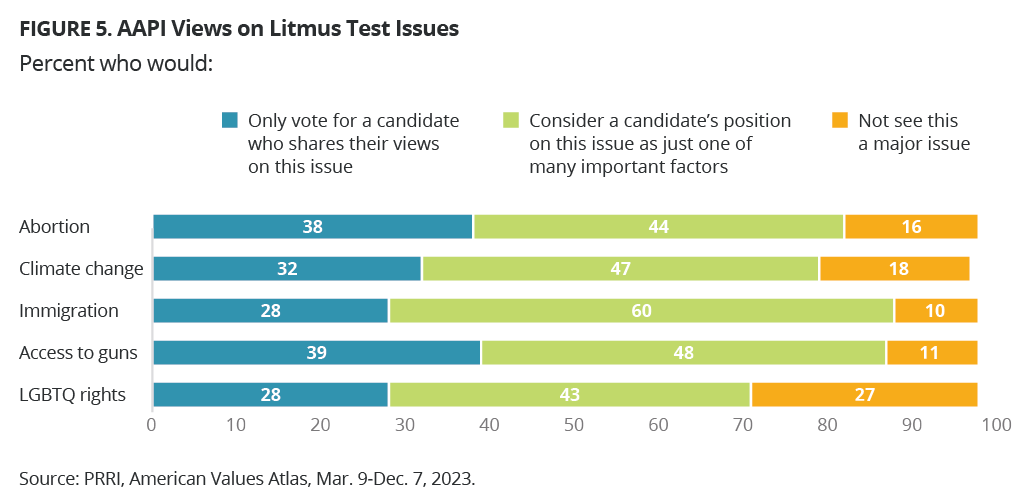Understanding Religion and Partisanship Among AAPI Voters Ahead of the 2024 Presidential Election

Though a small percentage of the U.S. population, Asian Americans and Pacific Islanders (AAPI Americans) are the fastest-growing group of eligible voters in the United States. In recent elections, Asian Americans and Pacific Islanders have made up a strong Democratic voting bloc, with more than six in ten AAPI voters supporting Joe Biden (61%) in 2020 and Hillary Clinton (65%) in 2016. The highest AAPI Democratic support seen in recent elections was for Barack Obama’s re-election in 2012 at 73%, however, there was stable majority support from the AAPI community for Obama in 2008 (62%), John Kerry in 2004 (56%), and Al Gore in 2000 (55%).
This Spotlight Analysis takes a closer look at Asian American and Pacific Islander partisan affiliations today and the relationship between AAPI Americans’ religious affiliation and partisanship. Finally, we consider how AAPI Americans view the likely 2024 presidential nominees, President Joe Biden and former President Donald Trump, by religion, gender, and education levels. PRRI data find that few AAPI Americans hold favorable views of Trump compared with Biden, but support forBiden among non-college graduates and AAPI Christians AAPI Americans is less secure.
Religious Affiliation Among AAPI Americans From 2013 to 2023
As of 2023, less than four in ten AAPI Americans identify as Christian (37%), this includes 20% of AAPI Americans who are Protestant, 16% who are Catholic, and less than one percent whoare each Jehovah’s Witnesses and Latter-day Saints. The share of AAPI Christians has remained around the same since 2013 (35%), reaching its lowest percentage in 2017 (30%) and highest in 2022 (41%).
Around three in ten AAPI Americans (28%) identify with a non-Christian religion in 2023, with 14% identifying as Hindu, 7% as Buddhist, 4% as Muslim, 2% as another non-Christian religion, and less than one percent as Unitarian Universalist. There has been little change in the percentage of non-Christian AAPI Americans since 2013, reaching a low of 25% in 2022 and a high of 32% in 2017.
More than one-third of AAPI Americans are religiously unaffiliated (35%), larger than the share of any other racial or ethnic group. Around a third of AAPI Americans have been religiously unaffiliated since PRRI began collecting this data in 2013.
Party Affiliation Among AAPI Americans From 2013 to 2023
As of 2023, a plurality of AAPI Americans identifies as Democrats (38%), a slight increase from 2013 (32%). Around one-third of AAPI Americans identify as independent (35%), a decline from more than four in ten (43%) in 2013. The percentage of AAPI Americans who identify as Republican has increased slightly since 2013 from 12% to 17% in 2023.
Currently, one-third of AAPI Christians identify as Democrats (33%), an increase from 26% in 2013. The percentage of AAPI Christians who identify as independent has declined nearly 10 percentage points from 37% in 2013 to 28% in 2023 while the percentage identifying as Republican has grown slightly from 23% to 28% in that period.
More than four in ten non-Christian AAPI Americans identify aspolitical independents (43%), which has remained consistentsince 2013. More than one-third of non-Christian AAPI Americans identify as Democrats (36%), similar to 2013 (39%).Finally, the percentage of non-Christian AAPI Americans who identify as Republican has nearly doubled from 7% in 2013 to 13% in 2023.
A plurality of religiously unaffiliated AAPI Americans identifiesas Democrats (44%), a 13 percentage-point increase since 2013 (31%). More than one-third of unaffiliated AAPI Americansidentify as independent (36%), a steep decline from half of unaffiliated AAPI Americans in 2013 (50%), and less than one in ten unaffiliated AAPI Americans identify as Republican(8%), which has remained consistent compared with 2013 (7%).
2024 Presidential Candidates’ Favorability Among AAPI Voters
Donald Trump
As of 2023, less than one in four AAPI Americans hold a favorable view of Donald Trump (22%); this is true for AAPI women (23%) and AAPI men (22%).
Asian Americans and Pacific Islanders without a college degree (30%) are more likely than those with a four-year degree or higher (17%) to view Trump favorably and religiously unaffiliated AAPI Americans (11%) are significantly less likely than AAPI Christians (29%) or AAPI non-Christians (28%) to hold a favorable view of Trump.
Joe Biden
More than half of AAPI Americans say they view Joe Biden favorably (53%), with little difference between AAPI men (54%) and AAPI women (52%).
Asian Americans and Pacific Islanders with a four-year degree or higher (61%) are much more likely than those without a college degree (38%) to have favorable views of Biden. More than six in ten religiously unaffiliated AAPI Americans (63%)hold favorable views of Biden compared with 52% of non-Christian AAPI Americans and 43% of AAPI Christians.
What Issues Matter to AAPI Voters
Nearly four in ten Asian Americans and Pacific Islanders say they would only vote for a candidate who shares their views on access to guns (39%) or abortion (38%), compared with aroundthree in ten who say they would vote based on a candidate’s stance on climate change (32%), immigration (28%), and LGBTQ rights (28%). Interestingly, although an equal percentage of AAPI Americans say they would vote for a candidate based on their stance on immigration and LGBTQ rights (both 28%), more AAPI Americans say they consider a candidate’s position on immigration as one of many important factors (60%) than say the same about LGBTQ rights (43%).

